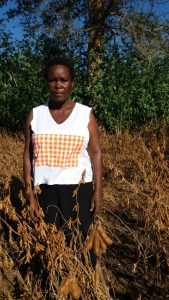Lucia Munkombo is Farmer Coordinator under the Conservation Farming Unit, residing at the Maimwene Resettlement Scheme, in Mumbwa, Central Province of Zambia.
Ms Munkombo started conservation farming in 2001, eventually becoming a Farmer Coordinator. She is also a widow who lost her husband in 1996 and is currently caring for four grandchildren. These children, and her children before that, have all been put through school from the profits from her farming.
On her thoughts regarding Conservation Farming, she said, “We learn early land preparation and we also teach our farmers how to manage their fields starting at zero”. If the farmers only have access to hoes, they teach farmers how to make basins, spacing and the depth of the holes, and if the farmers have cattle, they teach them ripping. She said when they leave the cattle level, they teach them tractor. Farmers hire the local Tillage Service Provider (TSP) to rip the lines for them if they do not own a tractor.
This year, her area, Mwaimwene, had little rain. Lucia stated that “those who practised Conservation Farming will not have hunger, and will have enough money to educate their children”. When they were teaching the farmers, they taught them that the key to conservation farming is climate change. She added that one needs to see how the rain is falling – if someone is not practising Conservation Farming, they will face hunger because if the rain falls in little amounts, the soil is dry. She felt that in Mumbwa District, there are a lot of farmers who are practising Conservation Farming, and that there is no hunger.
She said those who are dragging their feet are wasting time, because problems in their villages will never end, and that when they call for trainings, they should come and learn the way others do, instead of just sitting and accusing others of bewitching their fields.
Lucia said, “There is no witchcraft… people bewitch themselves because they lag, and those that are lagging should come on board and learn about conservation farming”.
